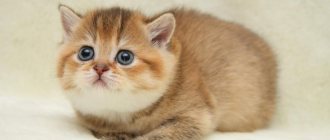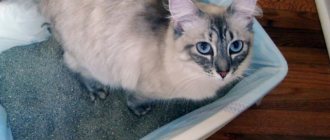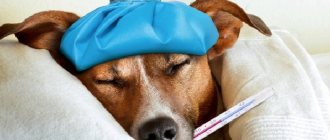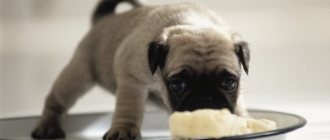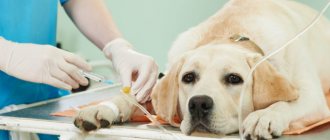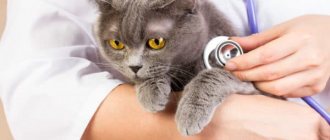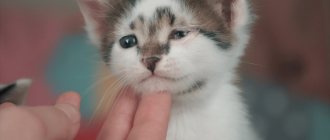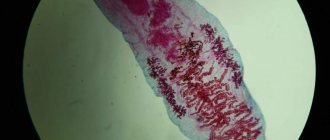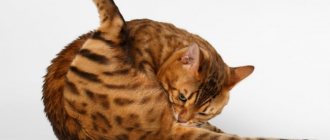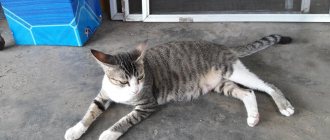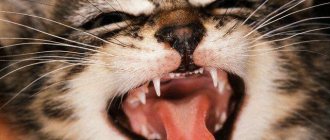8866Administration
Diarrhea, diarrhea or loose stools in a kitten are problems with the gastrointestinal tract. The disorder can be caused by many reasons, occur with acute symptoms and be a harbinger of complex diseases.
If your pet constantly has diarrhea, then this is already a signal of a serious disorder in the absorption of food, and it requires careful treatment, which should be carried out only as prescribed and under the supervision of a specialist, and for more than one month.
© shutterstock
Causes of diarrhea in a kitten
There may be several reasons that cause the development of diarrhea in kittens:
- Dietary disorders. This situation arises in cases where the kitten is fed from a common table, the same food that the owners themselves eat. It is strictly forbidden to give: meat that has not undergone heat treatment, salads, soups and any smoked and salted foods. A sudden change in diet can lead to disruption of digestion and, as a result, the development of diarrhea and vomiting. Such a reaction may also occur when switching from mother's milk to "adult" food as a result of stress. Read about premium food for kittens.
- Helminthic infestations can provoke disturbances in the gastrointestinal tract and the development of diarrhea.
- Viruses and bacteria, when they enter a kitten’s fragile body, provoke diarrhea. Teenage kittens are more often susceptible to such conditions.
- Chemical poisoning.
- Moving to new owners is very stressful for the baby. Some kittens develop diarrhea as a result.
Also read about diarrhea in adult cats.
Causes
Diarrhea in a kitten appears several times more often than in adults. What is the reason?
Among the factors contributing to this are:
- Imperfect formation of the digestive system of small kittens.
- Rapid growth and development of the body.
- I still have a weak immune system.
Reasons that can cause diarrhea in kittens include:
- Viral and bacterial infections.
- Poisoning with any chemical substance.
- Worm infestation.
- Changing your diet. This is usually the time when a small kitten comes to a new home. If owners are unfamiliar with the methods of raising cats, problems may arise with proper nutrition of the animal. To begin with, the kitten will be fed everything or even given food that will not be fully absorbed in the small body. Then the grown-up baby will begin to beg for tasty morsels, which inevitably leads to overeating and, as a consequence, to diarrhea.
- Worms - most kittens have these parasites to one degree or another. A baby can become infected from mother's milk, and worms are also transmitted to kittens through fur and from each other. And over time, parasites will begin to enter the body of older cats with adult food, on the street, from fleas.
Kittens have a very sensitive gastrointestinal tract, so you should not suddenly change their diet, especially if low-quality food was used. The stress kittens may experience when moving can also cause distress.
Features of diarrhea in kittens
With severe diarrhea, the kitten’s body loses a large amount of fluid and minerals, and therefore dehydration may develop, which is dangerous for a fragile baby. It is imperative to treat this condition and not wait for it to go away on its own.
If your pet feels well and is still cheerful and active, it is not necessary to see a veterinarian; you can try to cope on your own. But it is worth remembering that if you have intestinal problems and behavioral disturbances (lethargy, sleeps a lot and plays little), you should definitely consult a veterinarian.
Basic principles in treating diarrhea at home:
- It is necessary to remember what new foods have been added to the diet in the last few days, as they may be the cause of diarrhea. It is also worth giving up milk and sour milk, food from the common table. It is necessary to provide special food for kittens according to their age.
- New foods should be introduced into the diet in microdoses and no more than one every few days. After looking at the animal's reaction and making sure that there are no unnatural consequences, gradually increase the amount of new food.
- Put all food out of reach, as even small kittens can jump to quite high heights and eat food left unattended.
- Limit the amount of food you eat, but make sure your pet always has fresh drinking water available. Often, during illness, animals completely refuse to eat, but drink large amounts of liquid, thereby normalizing their water balance.
- It is imperative to carry out regular wet cleaning in the apartment, especially in hard-to-reach places where cats like to hide.
- When choosing a detergent, pay attention to safe, biodegradable ones. They do not contain chlorine or other substances hazardous to the animal’s body.
- During illness, treat your pet more carefully, play only when he shows interest, and try not to disturb him again.
Signs of incipient dehydration
So what should you do to avoid starting the process? It's simple - you need to carefully monitor your pets. Firstly, with a lack of fluid, small kittens instantly become lethargic, quickly lose interest in their surroundings, and try to lie down longer. They are not attracted to food and drink, and the animals' bodies become noticeably cool to the touch. Secondly, the pet’s skin becomes dry, hard, and feels like parchment to the touch.
Attention! If you notice any of the signs we described, take your pet to the vet immediately! If you delay even a day (not to mention a day), then, most likely, there will be no one to save.
Features of diarrhea in purebred kittens
Experts have identified a pattern that outbred or mixed breed kittens have better health and stable immunity compared to purebred artificially bred felines.
For example, British and Scottish kittens have an extremely sensitive gastrointestinal system. Therefore, you should be careful about their diet.
British kitten
Features in helping purebred kittens with diarrhea:
- Organize a specific place for the kitten where he feels protected. Try not to pick him up again and ensure complete peace: do not pester him with games and prohibit small children (if there are any in the family) from squeezing the kitten.
- If diarrhea begins, stop all feedings for 10-12 hours, and a bowl of clean drinking water should always be available in an accessible place to avoid dehydration.
- After diarrhea stops, start eating with small doses. It is better to underfeed than to overfeed, as excess food can lead to the recurrence of diarrhea.
- You should refuse ready-made food for the recovery period. Allowed for feeding: hard-boiled chicken egg yolk, a little lean boiled meat, for example, chicken breast, oatmeal or rice porridge, diluted with meat broth.
- Fermented milk products, milk and fish are completely excluded from the diet.
Chronic diarrhea - secretory diarrhea
People say about secretory diarrhea: “like a clove” or “just water.” If a person with chronic diarrhea experiences pain, dizziness, weakness, nausea and dry throat, then rest assured that your cat is not feeling any better.
Changes in intestinal function occur due to impaired absorption and transport of water through its lumens. The water necessary for organizing the normal functioning of all body systems is simply excreted through copious loose stools. Rapid dehydration occurs, which can lead to the death of the animal.
Defecation with secretory diarrhea is painless, but brings only short-term relief, quickly replaced by pain due to accumulating gases and painful spasms.
Attention!
If watery stools turn brown-green or become deep yellow (to orange), this indicates a decrease in the contractile functions of the bladder walls and the absorption of bile secretions - hologenic diarrhea.
The appearance of white stool directly indicates the degeneration of liver tissue: jaundice, cirrhosis and cancer.
Bilirubin not processed by the liver provokes pathology of the intestines, expressed in random attacks of diarrhea, which owners mistake for an acute variant and try to find “the best cure for diarrhea for cats, because THIS no longer helps!”
Vomiting and diarrhea
If diarrhea is also accompanied by vomiting, it is necessary to urgently show your pet to a veterinarian, as this is an alarming sign indicating a serious illness. In case of untimely or incorrect treatment of a kitten, complications and deterioration of the condition may develop, even death.
If the animal is in serious condition, it is better to contact an emergency veterinarian and call a doctor at home. He will conduct the necessary diagnostic tests and prescribe treatment.
In addition to the medications prescribed by the veterinarian, it is necessary to disinfect household items: a bowl, a bed, pet toys; Organize a quiet place for the kitten to rest, place a bowl of clean water nearby and change it as needed. In especially severe cases, give the kitten a little sweetened water from a syringe to restore the acid-base balance.
Why is diarrhea dangerous in kittens?
The main danger of diarrhea is the onset of dehydration and intoxication of the kitten’s body. These two conditions are the leading causes of death. Along with liquid stool, microelements, vitamins and other useful substances necessary for the normal functioning of the body are washed out of the animal’s body. As a result, the acid-base balance is disrupted, which provokes malfunctions in the functioning of internal organs and systems. At the same time, the kitten’s activity sharply decreases, it becomes lethargic and stops playing.
These are extremely alarming signs, and if detected, you should immediately consult a specialist.
By the color of the stool you can determine the cause of diarrhea:
- The yellow color of stool can be caused by: severe poisoning, blockage of the bile ducts, congenital or acquired (chronic) liver pathology. In acute pancreatitis, the color of the feces is bright yellow.
- Green color indicates dysbacteriosis: as a result, the normal microflora of the kitten’s intestines is replaced by pathogenic ones. This is typical during long-term antibiotic therapy or consumption of stale foods.
- White – bilirubin, bile acids and bile itself are responsible for the color of stool. When the ducts that remove it are blocked, these substances do not enter the intestines, which leads to discoloration of feces. This condition is extremely serious and requires immediate treatment, often surgery.
- The presence of blood in excrement indicates damage to the lower parts of the digestive tract: large or small intestine; black color indicates damage to the upper parts: esophagus, stomach, duodenum. The most common cause of such situations is traumatization by foreign bodies, for example, fish, tubular chicken bones.
- The appearance of mucus and putrid odor from feces indicates the presence of helminths in the kitten’s body.
- Diarrhea with water without the presence of any impurities (blood, mucus, etc.) is not a consequence of a pathological process, but occurs due to excessive consumption of liquid.
Acute attack of diarrhea
A small kitten runs to the litter box quite often - this is normal if the stool has a normal color, smell and consistency. Changes in food, imperfections in the gastrointestinal tract, physical or nervous “overload,” overheating or, conversely, hypothermia, the first day of vaccination – all this often leads to diarrhea in a cat.
The appearance of mucus, blood in the stool, and changes in density should alert the owner.
In an old cat, alternating constipation with isolated cases of diarrhea is an almost normal phenomenon associated with decreased intestinal motility due to age. Preventive advice from a veterinarian, correction of diet and nutrition, encouragement to do more physical activity and possible use of appropriate medications will help here.
Symptoms requiring veterinary intervention
There are signs that, if you notice them in your pet, you should immediately consult a veterinarian, or better yet, call them at home, so as not to further aggravate the kitten’s condition:
- blood in excrement;
- frequent and profuse diarrhea;
- a large amount of mucus in the stool;
- constant meowing and restless behavior of the pet, which indicates the pain he is experiencing;
- suspicion of poisoning, for example, insect control was recently carried out in the room where the kitten is located;
- diarrhea continues for quite a long time (more than 20 hours), behavior has changed dramatically: lethargy has appeared, the kitten has stopped playing, sleeps a lot, etc.;
- the occurrence of convulsions or vomiting associated with diarrhea.
When is it necessary to use the help of a veterinarian?
There is a possibility that your kitten's diarrhea is caused by some serious illness. In what cases is it important to immediately seek the help of a veterinarian?
- The kitten has diarrhea with blood or mucus;
- The kitten's diarrhea continues for more than one day;
- The stools are copious and very liquid;
- The kitten meows pitifully, sometimes even hysterically (this can be caused by severe pain);
- The kitten has diarrhea and vomiting at the same time;
- There is a pallor of the nose and gums;
- Body temperature rises;
- Feverish state, convulsions;
- stench (more than usual) during bowel movements;
- The kitten cannot quench its thirst.
If you have one of the listed symptoms, diarrhea, it is very important to urgently take your pet to the veterinarian
. The pet will be examined, the cause of the disease will be determined, and after diagnosis, a course of treatment will be prescribed.
Treatment of diarrhea depending on symptoms
There are several main reasons that cause diarrhea, and depending on them the choice of treatment tactics is made:
- Diarrhea resulting from improper feeding and overeating. A small kitten should be given complementary foods very carefully, in small portions, since its digestive system is not yet perfect and vomiting and diarrhea may develop. If such reactions occur, it is worth eliminating the product to which such a reaction occurred and reducing the amount of food consumed.
- Diarrhea with blood - the veterinarian prescribes medications to normalize the gastrointestinal tract, anthelmintics, and antibiotics. If foreign bodies that cause bleeding are detected, they are removed.
- If diarrhea occurs as a result of intestinal dysbiosis, medications are prescribed to normalize the microflora.
- In case of a bacterial infection, antibiotic therapy is prescribed, administered subcutaneously or intravenously.
- An admixture of mucus in the stool indicates a helminthic infestation or the consequences of their treatment - if anthelmintic drugs have recently been given, since the mucus in this case is the undigested remains of helminths.
Diarrhea accompanied by refusal to eat in a very young kitten recently separated from its mother is a common occurrence. It occurs as a result of a stressful situation and does not require specific treatment.
For prolonged diarrhea that threatens dehydration, intravenous drip administration of detoxification drugs and parenteral nutrition agents is prescribed.
Depending on age:
- The development of diarrhea in the newborn state and in the first month of life is most often associated with congenital developmental anomalies or intrauterine infection with infectious diseases. Bad milk in a cat can also cause diarrhea. Due to their early age and immaturity of the body, in most cases, kittens die. This is also due to poor absorption of drugs by an immature body.
- At 2 months of age, diarrhea is most often associated with a change of place of residence. Most kittens are given to new owners, which is very stressful for them. Therefore, when you take your baby into your home, you should be very careful about organizing a place for him, give him the opportunity to get comfortable, and not get bored with games at first. At the same time, do not forget about proper nutrition and try to bring it as close as possible to your usual diet.
- Three-month-old kittens are already grown-up creatures full of energy and curiosity. The main causes of diarrhea at this age are the following: overeating (they cannot yet dose the amount of food they need on their own), eating objects that are not suitable for this (associated with increased curiosity), and deworming.
- At 4 months and older, the causes of diarrhea are the same as in adult cats: stress and diseases of the digestive tract. Having identified the cause of diarrhea, the veterinarian will prescribe treatment in accordance with it.
At home
If rare episodes of diarrhea occur while the kitten is feeling normally, and emergency veterinary care is not required, following simple rules will help your pet:
- organize peace and not disturb the baby again;
- refuse food for 24 hours, followed by dosed meals in small portions;
- ensure constant access to clean water;
- if there is a relationship between the appearance of diarrhea and eating certain foods, completely eliminate these foods from the diet;
- drink a decoction of rice, flax seeds or oak bark;
- in case of increased gas formation, give children's Smecta or Activated Carbon diluted in water, or any other adsorbent approved for use in kittens.
Treatment with drugs
The list of medications prescribed for kittens is not that extensive:
- Activated carbon – used in the absence of additional symptoms other than diarrhea, while maintaining the pet’s good health;
- Smecta - helps with increased gas formation, to consolidate stool. The dosage should be checked with a veterinarian depending on age and condition;
- Enterosgel is a good remedy that helps with all forms of diarrhea;
- Loperamide - should be given in exceptional cases, in accordance with the prescribed dosage;
- Antibiotics are prescribed by the doctor, depending on the infectious agent that caused the diarrhea;
- Enterofuril - approved for use in kittens; it is more convenient to use a suspension.
List of medications for treating diarrhea
We have prepared for you a rating of the most popular medications and tablets for diarrhea in kittens.
| Activated carbon | The use of this drug is justified only if the kitten simply has diarrhea without additional alarming symptoms. If the pet, despite loose stools, is cheerful and playful, then it is quite possible that with charcoal as a medicine, everything will end and soon the baby’s stool will return to normal. |
| Smecta | The drug has proven itself well in the market of products that promote stool consolidation. You can trust the health of your little pet with Smecta for kittens. And the only thing that needs to be fully understood is the dosage of the drug. |
| Loperamide | Loperamide for kittens is not the best option. Yes, the Internet is full of advice on this topic, but it should be borne in mind that this is still a human drug and even for adult cats the dosage must be selected with special care. What can we say about the fragile body of a defenseless kitten? Therefore, if possible, it is better to treat the baby with something else. |
| Enterosgel | This human drug has taken its rightful place in the first aid kits of cat lovers, since in some cases it is truly an indispensable first aid remedy for a pet. Enterosgel for kittens will help cleanse the baby's body of toxins. Kittens can be given it when:
Enterosgel for kittens is an excellent opportunity to help your baby from the very beginning of the disease. |
| Antibiotics | All antibacterial drugs are divided into classes. This includes both drugs that inhibit the development of bacteria and bactericidal antibiotics for kittens. The most popular medicines include:
Looking from the outside at the mass of these obscure names, it is easy to understand that only a qualified veterinarian can understand this. |
| Enterofuril | The only contraindication for use is age - up to a month, as well as individual intolerance to any active components of Enterofuril, which can provoke an allergic reaction to use. In other cases, this powerful antimicrobial drug will help deal with diarrhea in a kitten in a fairly short time. Moreover, for babies it is better to buy a suspension, since it has a more moderate effect on the weak body of a small kitten. |
Nutrition for diarrhea
If there are repeated episodes of loose stools, you should completely exclude the kitten from feeding.
The most optimal time to refuse food is 10-12 hours.
Throughout the “hungry period,” you need to make sure that the kitten always has a bowl of clean water nearby. If the animal is very weak and cannot drink on its own, it is given from a syringe or pipette in small doses at short intervals. This is done to prevent dehydration.
After 12 hours, feeding is resumed in small doses and low-calorie foods. Fermented milk products and milk are excluded from the menu.
Read the article about how long a cat can go without food.
Medicines
If a kitten has diarrhea, what else can be treated? Many people prefer medications from a pharmacy.
If a kitten has diarrhea (2 months), then you can give the drug "Atoxil". What is the dosage? A sachet of this drug must be diluted in 100 milliliters of water. Give one teaspoon every couple of hours.
The drug "Regidron" during diarrhea can help against dehydration. Prepare the solution according to the instructions. Give to a small patient in the same way as Atoxil.
A frequent question arises when a kitten has diarrhea: how to treat it? It is also recommended in such cases to use drugs such as Enterosgel or Smecta. "Bifidumbacterin" gives a good effect. The most convenient way to administer medicine into the mouth is to use a syringe without a needle. These drugs will help rid the body of toxins, causing their rapid elimination.
Prevention
- Proper nutrition with special cat food or food prepared separately. Feeding food from a human table is unacceptable.
- Regular cleaning of the animal's tray with disinfectants.
- Timely vaccination and deworming.
- Limiting stressful situations.
- Using detergents that are safe for cats.
It is worth remembering that a timely visit to the veterinarian when the first alarming symptoms occur increases the chances of a favorable treatment for your pet.
